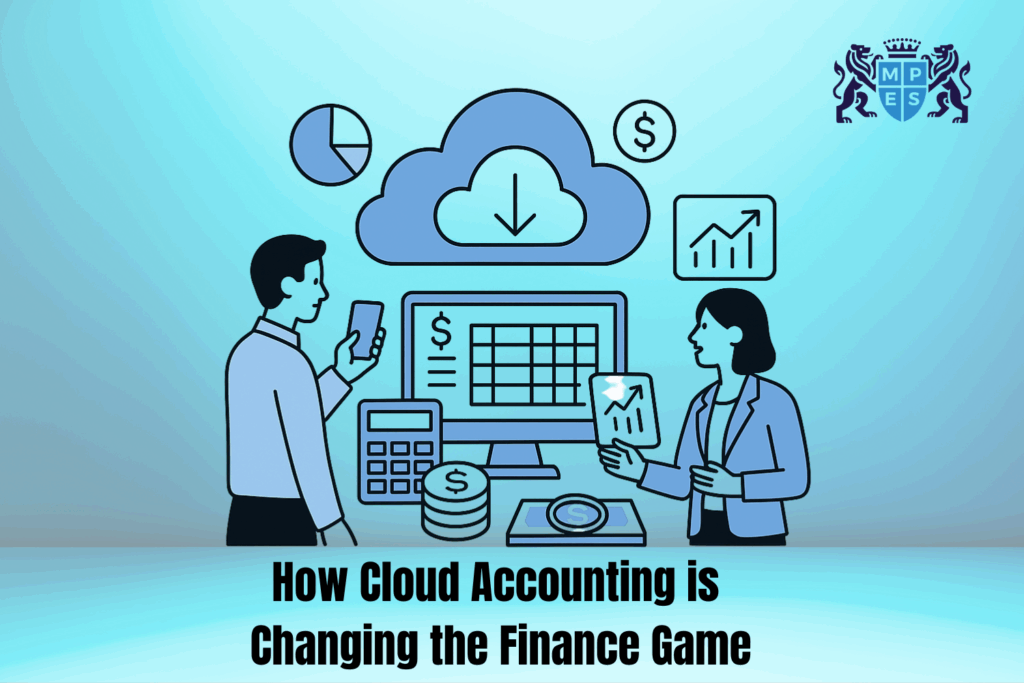What if you could check your company’s financial health as easily as checking your messages? That’s exactly where things are heading. For learners at the ACA Certificate Level, understanding What is Accounting goes far beyond ledgers and journals now. Today’s finance world is powered by technology, and cloud accounting is leading the charge. It’s fast, secure and surprisingly simple. Whether you run a business or support one, cloud platforms are changing how decisions are made and problems are solved.

In this blog, we’ll break down how cloud accounting is transforming the way finance works.
How Cloud Accounting is Transforming Everyday Finance Tasks
Cloud accounting is no longer just a trend; it’s reshaping how financial work is done. Below are some key ways it is changing the daily flow of finance and accounting activities:
From Spreadsheets to Smart Systems
The days of manually balancing numbers while scrolling through countless spreadsheets are long gone. Conventional desktop software had limited efficiency, cumbersome backups, and required frequent updates. Cloud accounting platforms have now simplified the management of financial records.
These systems automate the majority of the chores you would normally spend hours on. A few clicks can be used to send invoices, reconcile bank feeds and generate cash flow reports, among other tasks. It is more dependable in addition to being quicker.
By switching from manual to automated processes, human mistake is reduced, and more time is available for making more critical decisions. This transition from conventional approaches to smart platforms is something you’ll come across early in your learning process if you’re pursuing the ACA Certificate Level.
Real Time Data Means Real Time Decisions
The delay in obtaining precise financial data was one of the main disadvantages of traditional accounting. Reports frequently relied on data from the previous month. It was too late by the time you realised there was an issue.
Cloud accounting reverses that. These technologies sync transactions as they occur by establishing a direct connection with your bank account. This implies that you can always get the most recent numbers. You receive prompt responses whether you’re monitoring business margins, controlling cash flow, or examining spending.
This real-time visibility is particularly crucial when managing multiple projects simultaneously or responding to rapidly changing market conditions. Instead of waiting for month-end reports, finance teams and business managers can make well-informed choices immediately. Planning becomes proactive rather than reactive when financial data is constantly current.
Easy Collaboration Across Teams
Accounting is no longer something that is done alone. Several people in various roles can access modern cloud platforms. From wherever in the world, your co-founder, bookkeeper, financial manager, and accountant may all examine the same real-time data.
This shared visibility decreases misunderstandings. Sending files back and forth or wondering if someone is using the most recent version is unnecessary. Everyone agrees. To ensure that users only see what is pertinent to them, many tools additionally provide role-based access.
When you’re getting ready for your ACA Certificate Level, working together will come naturally to you. It reflects the way the majority of financial departments operate in the modern, digitally driven world.
Better Security Without the Stress
Data security is a frequent worry with cloud accounting. Online financial record storage may seem hazardous at first. However, the majority of trustworthy cloud service providers offer significantly more security than a personal laptop.
These solutions employ two-factor authentication, strong password processes, bank-level encryption, and automated backups kept in secure data centres. When adding new users or outside advisors, you may feel secure knowing that you have complete control over who can access what.
On the other hand, locals may be accidentally erased or lost due to hardware failure. With cloud accounting, your data is protected and available even if your device malfunctions.
Cost-Efficient and Scalable
The versatility that cloud systems provide is yet another significant benefit. The majority of cloud products are offered on a monthly or yearly subscription basis, in contrast to older software, which required significant upfront expenditures and expensive upgrades.
Consequently, you only pay for what you require. As they expand, small enterprises can add more features after starting with the most basic ones. Later data migration or system replacement is not required. It grows with your company.
Numerous cloud platforms can also be integrated with additional tools, including customer relationship management systems, payroll apps, and inventory software. This eliminates duplication and saves time by connecting your whole workflow.
Cloud Accounting Empowers Startups and SMEs
Cloud accounting is a real game-changer for small and startup companies. It eliminates the need to invest in pricey IT setups or engage a whole finance team. Everything can be accessed via a smartphone or laptop.
Real-time financial health monitoring, invoice creation, tax management, and spending tracking are all available to business owners. Corporate-level systems were once necessary for this type of control. It is now offered at a much lower price.
More significantly, it increases the founders’ confidence in their figures. Cloud accounting enables small businesses to make informed decisions and expand sustainably by reducing surprises and enhancing forecasts.
Conclusion
Cloud accounting is no longer the future. It is the present. From small startups to large organisations, businesses are embracing this shift for its speed, security and simplicity. It changes how finance is done and how accountants add value. To stay ahead, understanding these tools is crucial. A qualification through MPES Learning can help you gain confidence and clarity with both traditional and cloud-based accounting systems.

